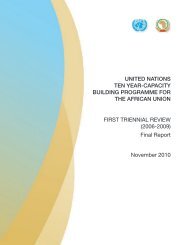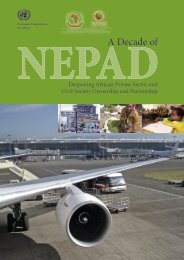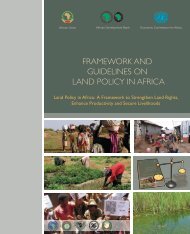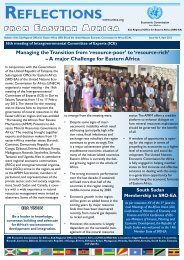Tool kit for Gender and Agriculture - Economic Commission for Africa
Tool kit for Gender and Agriculture - Economic Commission for Africa
Tool kit for Gender and Agriculture - Economic Commission for Africa
You also want an ePaper? Increase the reach of your titles
YUMPU automatically turns print PDFs into web optimized ePapers that Google loves.
28<br />
Improving <strong>Agriculture</strong> through <strong>Gender</strong> Analysis<br />
across villages village<br />
Choice of method. In general, surveys are used <strong>for</strong> data that need to be extrapolated<br />
to larger populations, whereas the other methods are more suitable <strong>for</strong> descriptive<br />
in<strong>for</strong>mation <strong>and</strong> <strong>for</strong> identifying relevant issues (see Box 6). Quantitative data are useful<br />
<strong>for</strong> sector work <strong>and</strong> to convince skeptics of the need to address gender issues. Project<br />
identification <strong>and</strong> appraisal requires in<strong>for</strong>mation on gender-roles <strong>and</strong> gender-specific<br />
barriers in the rural economy. Such in<strong>for</strong>mation should be supported by data on the focus<br />
of the project or program, from the monitoring <strong>and</strong> evaluation (M&E) or agricultural<br />
statistical units. The project design should include the collection <strong>and</strong> evaluation of<br />
gender-disaggregated data <strong>for</strong> monitoring <strong>and</strong> evaluation. Involving ministry staff,<br />
such as extension agents, in organizing, collecting, <strong>and</strong> analyzing in<strong>for</strong>mation is a good<br />
awareness-raising <strong>and</strong> training tool.<br />
Box 6: Household Surveys Compared with Rapid or Participatory Appraisals:<br />
Different Goals <strong>and</strong> Results<br />
• Large household surveys are costly <strong>and</strong> time consuming; the data are not always<br />
equally reliable. Surveys may, however, be needed <strong>for</strong> impact studies or <strong>for</strong> more<br />
detail⎯<strong>for</strong> example, when planning a credit program targeting women or studying<br />
female-headed households. <strong>Gender</strong>-disaggregated questions should be included<br />
(<strong>and</strong> exploited) whenever surveys are conducted.<br />
• Objectively conducted, less exacting methods, such as rapid or participatory rural<br />
appraisals, are preferable. Many different rapid appraisal techniques exist, such as<br />
focus groups, key in<strong>for</strong>mant interviews, village discussions, mapping, transect<br />
walks, seasonal analysis, trend diagramming, matrix ranking, wealth ranking, <strong>and</strong><br />
strength/weakness/opportunity/limitations (SWOL) analyses (<strong>for</strong> details, see Table<br />
5).<br />
• The method chosen depends on the type <strong>and</strong> amount of in<strong>for</strong>mation needed. Walking<br />
tours, spatial maps, <strong>and</strong> group interviews are especially suitable <strong>for</strong> natural resources<br />
management projects. Focus group interviews are useful <strong>for</strong> learning about<br />
gender roles in agriculture; they may be supplemented by calendars <strong>and</strong> labor profiles,<br />
if new technologies or commodities are being promoted.<br />
Two main sources⎯experienced staff <strong>and</strong> the rural population⎯should be used<br />
as cross-checks. Whenever possible, in<strong>for</strong>mation should be collected directly from rural<br />
women (see Box 5). Experienced women agents can provide a cross-check or be the<br />
main source of in<strong>for</strong>mation. The sample size should be decided after consulting extension<br />
staff on the homogeneity of gender roles in the farming system <strong>and</strong> of women’s<br />
other productive activities.







